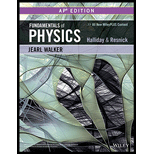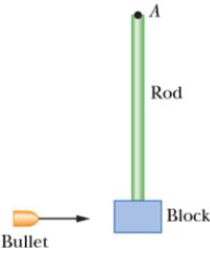
FUNDAMENTALS OF PHYSICS,AP ED.
11th Edition
ISBN: 9781119472780
Author: Halliday
Publisher: WILEY
expand_more
expand_more
format_list_bulleted
Concept explainers
Textbook Question
Chapter 11, Problem 60P
In Fig. 11-53, a 1.0 g bullet is tired into a 0.50 kg block attached to the end of a 0.60 m nonuniform rod of mass 0.50 kg. The block–rod–bullet system then rotates in the plane of the figure, about a fixed axis at A. The rotational inertia of the rod alone about that axis at A is 0.060 kg m2. Treat the block as a particle. (a) What then is the rotational inertia of the block–rod–bullet system about point A? (b) If the angular speed of the system about A just after impact is 4.5 rad/s. what is the bullet’s speed just before impact?

Figure 11-53 Problem 60.
Expert Solution & Answer
Want to see the full answer?
Check out a sample textbook solution
Students have asked these similar questions
3
Set
ба
||Axl
49.32
6b
71
Ay
22
Magnitude of A
Angle of A
24.04
Angle of -A
22
54
155.96
° (pos Ax) 204.04
° (neg Ax) 335.96
°
(pos Ax)
° (neg Ax)
115.77
° (pos Ax) 295.77
° (pos Ax)
-39
81
208.78
° (neg Ax) 28.78
°
(neg Ax)
3AA . not sure what i am getting wrong
Chapter 11 Solutions
FUNDAMENTALS OF PHYSICS,AP ED.
Ch. 11 - Figure 11-23 shows three particles of the same...Ch. 11 - Figure 11-24 shows two particles A and B at xyz...Ch. 11 - Prob. 3QCh. 11 - The position vector r of a particle relative to a...Ch. 11 - In Fig. 11-26, three forces of the same magnitude...Ch. 11 - The angular momenta t of a particle in four...Ch. 11 - A rhinoceros beetle rides the rim of a horizontal...Ch. 11 - Figure 11-27 shows an overhead view of a...Ch. 11 - Figure 11-38 gives the angular momentum magnitude...Ch. 11 - Figure 11-29 shows a particle moving at constant...
Ch. 11 - A cannonball and a marble roll smoothly from rest...Ch. 11 - Prob. 12QCh. 11 - A car travels at 80 km/h on a level road in the...Ch. 11 - An automobile traveling at 80.0 km/h has tires of...Ch. 11 - Prob. 3PCh. 11 - A uniform solid sphere rolls down an incline. a...Ch. 11 - ILW A 1000 kg car has four 10 kg wheels. When the...Ch. 11 - Figure 11-30 gives the speed v versus time t for a...Ch. 11 - ILW In Fig. 11-31, a solid cylinder of radius 10cm...Ch. 11 - Figure 11-32 shows the potential energy Ux of a...Ch. 11 - GO In Fig. 11-33, a solid ball rolls smoothly from...Ch. 11 - A hollow sphere of radius 0.15 m, with rotational...Ch. 11 - In Fig. 11-34, a constant horizontal force Fapp of...Ch. 11 - GO In Fig. 11-35, a solid brass ball of mass 0.280...Ch. 11 - GO Nonuniform ball. In Fig. 11-36, a ball of mass...Ch. 11 - In Fig. 11-37, a small, solid, uniform ball is to...Ch. 11 - GO A bowler throws a bowling ball of radius R = 11...Ch. 11 - GO Nonuniform cylindrical object. In Fig. 11-39, a...Ch. 11 - SSM A yo-yo has a rotational inertia of 950 gcm2...Ch. 11 - Prob. 18PCh. 11 - In unit-vector notation, what is the net torque...Ch. 11 - A plum is located at coordinates 2.0 m, 0, 4.0 m....Ch. 11 - In unit-vector notation, what is the torque about...Ch. 11 - A particle moves through an xyz coordinate system...Ch. 11 - Force F=(2.0N)i(3.0N)k acts on a pebble with...Ch. 11 - In unit-vector notation, what is the torque about...Ch. 11 - SSM Force F=(8.0N)i+(6.0N)j acts on a particle...Ch. 11 - At the instant of Fig. 11-40, a 2.0 kg particle P...Ch. 11 - SSM At one instant, force F=4.0N acts on a 0.25 kg...Ch. 11 - A 2.0 kg particle-like object moves in a plant...Ch. 11 - ILW In the instant of Fig, 11-41, two particles...Ch. 11 - At the instant the displacement of a 2.00 kg...Ch. 11 - In Fig. 11-42, a 0.400 kg ball is shot directly...Ch. 11 - A particle is acted on by two torques about the...Ch. 11 - Prob. 33PCh. 11 - A particle is to move in an xy plane, clockwise...Ch. 11 - Prob. 35PCh. 11 - Prob. 36PCh. 11 - GO In Fig. 11-44, three particles of mass m = 23 g...Ch. 11 - A sanding disk with rotational inertia 1.2 103...Ch. 11 - SSM The angular momentum of a flywheel having a...Ch. 11 - A disk with a rotational inertia of 7.00 kgm2...Ch. 11 - GO Figure 11-45 shows a rigid structure consisting...Ch. 11 - Figure 11-46 gives the torque that acts on an...Ch. 11 - Prob. 43PCh. 11 - A Texas cockroach of mass 0.17 kg runs...Ch. 11 - SSM WWW A man stands on a platform that is...Ch. 11 - The rotational inertia of a collapsing spinning...Ch. 11 - SSM A track is mounted on a large wheel that is...Ch. 11 - A Texas cockroach walks from the center of a...Ch. 11 - Two disks are mounted like a merry-go-round on...Ch. 11 - The rotor of an electric motor has rotational...Ch. 11 - SSM ILW A wheel is rotating freely at angular...Ch. 11 - GO A cockroach of mass m lies on the rim of a...Ch. 11 - GO In Fig. 11-50 an overhead view, a uniform thin...Ch. 11 - GO Figure 11-51 shows an overhead view of a ring...Ch. 11 - A horizontal vinyl record of mass 0.10 kg and...Ch. 11 - In a long jump, an athlete leaves the ground with...Ch. 11 - A uniform disk of mass 10m and radius 3.0r can...Ch. 11 - A horizontal platform in the shape of a circular...Ch. 11 - Figure 11-52 is an overhead view of a thin uniform...Ch. 11 - In Fig. 11-53, a 1.0 g bullet is tired into a 0.50...Ch. 11 - The uniform rod length 0.60 m, mass 1.0 kg in Fig....Ch. 11 - GO During a jump to his partner, an aerialist is...Ch. 11 - GO In Fig. 11-56, a 30 kg child stands on the edge...Ch. 11 - A ballerina begins a tour jet Fig. 11-19a with...Ch. 11 - SSM WWW Two 2.00 kg balls are attached to the ends...Ch. 11 - Prob. 66PCh. 11 - Prob. 67PCh. 11 - Prob. 68PCh. 11 - A certain gyroscope consists of a uniform disk...Ch. 11 - A uniform solid ball rolls smoothly along a floor,...Ch. 11 - SSM In Fig. 11-60, a constant horizontal force...Ch. 11 - A thin-walled pipe rolls along the floor. What is...Ch. 11 - Prob. 73PCh. 11 - Prob. 74PCh. 11 - Prob. 75PCh. 11 - A uniform block of granite in the shape of a book...Ch. 11 - SSM Two particles, each of mass 2.90 104 kg and...Ch. 11 - A wheel of radius 0.250 m, moving initially al...Ch. 11 - Wheels A and B in Fig. 11-61 are connected by a...Ch. 11 - Prob. 80PCh. 11 - SSM A uniform wheel of mass 10.0 kg and radius...Ch. 11 - A uniform rod rotates in a horizontal plane about...Ch. 11 - A solid sphere of weight 36.0 N rolls up an...Ch. 11 - Suppose that the yo-yo in Problem 17, instead of...Ch. 11 - A girl of mass M stands on the rim of a...Ch. 11 - Prob. 86P
Knowledge Booster
Learn more about
Need a deep-dive on the concept behind this application? Look no further. Learn more about this topic, physics and related others by exploring similar questions and additional content below.Similar questions
arrow_back_ios
SEE MORE QUESTIONS
arrow_forward_ios
Recommended textbooks for you
 University Physics Volume 1PhysicsISBN:9781938168277Author:William Moebs, Samuel J. Ling, Jeff SannyPublisher:OpenStax - Rice University
University Physics Volume 1PhysicsISBN:9781938168277Author:William Moebs, Samuel J. Ling, Jeff SannyPublisher:OpenStax - Rice University Physics for Scientists and Engineers: Foundations...PhysicsISBN:9781133939146Author:Katz, Debora M.Publisher:Cengage Learning
Physics for Scientists and Engineers: Foundations...PhysicsISBN:9781133939146Author:Katz, Debora M.Publisher:Cengage Learning Principles of Physics: A Calculus-Based TextPhysicsISBN:9781133104261Author:Raymond A. Serway, John W. JewettPublisher:Cengage Learning
Principles of Physics: A Calculus-Based TextPhysicsISBN:9781133104261Author:Raymond A. Serway, John W. JewettPublisher:Cengage Learning Glencoe Physics: Principles and Problems, Student...PhysicsISBN:9780078807213Author:Paul W. ZitzewitzPublisher:Glencoe/McGraw-Hill
Glencoe Physics: Principles and Problems, Student...PhysicsISBN:9780078807213Author:Paul W. ZitzewitzPublisher:Glencoe/McGraw-Hill Physics for Scientists and Engineers, Technology ...PhysicsISBN:9781305116399Author:Raymond A. Serway, John W. JewettPublisher:Cengage Learning
Physics for Scientists and Engineers, Technology ...PhysicsISBN:9781305116399Author:Raymond A. Serway, John W. JewettPublisher:Cengage Learning Classical Dynamics of Particles and SystemsPhysicsISBN:9780534408961Author:Stephen T. Thornton, Jerry B. MarionPublisher:Cengage Learning
Classical Dynamics of Particles and SystemsPhysicsISBN:9780534408961Author:Stephen T. Thornton, Jerry B. MarionPublisher:Cengage Learning

University Physics Volume 1
Physics
ISBN:9781938168277
Author:William Moebs, Samuel J. Ling, Jeff Sanny
Publisher:OpenStax - Rice University

Physics for Scientists and Engineers: Foundations...
Physics
ISBN:9781133939146
Author:Katz, Debora M.
Publisher:Cengage Learning

Principles of Physics: A Calculus-Based Text
Physics
ISBN:9781133104261
Author:Raymond A. Serway, John W. Jewett
Publisher:Cengage Learning

Glencoe Physics: Principles and Problems, Student...
Physics
ISBN:9780078807213
Author:Paul W. Zitzewitz
Publisher:Glencoe/McGraw-Hill

Physics for Scientists and Engineers, Technology ...
Physics
ISBN:9781305116399
Author:Raymond A. Serway, John W. Jewett
Publisher:Cengage Learning

Classical Dynamics of Particles and Systems
Physics
ISBN:9780534408961
Author:Stephen T. Thornton, Jerry B. Marion
Publisher:Cengage Learning
Moment of Inertia; Author: Physics with Professor Matt Anderson;https://www.youtube.com/watch?v=ZrGhUTeIlWs;License: Standard Youtube License